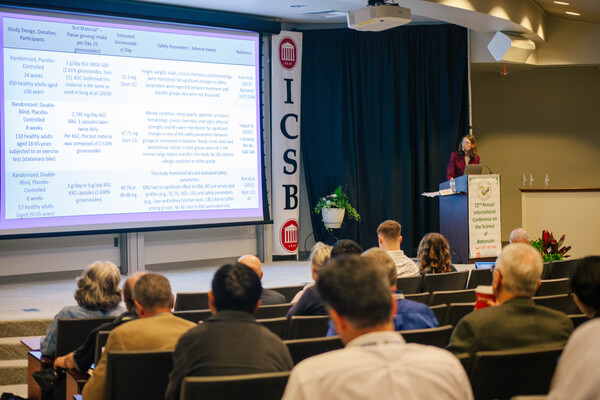Jung Kwan Jang, Korea’s top ginseng product manufacturer, said it conducted a seminar focused on the efficacy and safety of red ginseng during the International Conference on the Science of Botanicals, held in Oxford, Miss., from April 15 to 18.

The International Conference on the Science of Botanicals, overseen by the National Center for Natural Products Research (NCNPR), is an annual event held in that U.S. city.
It serves as a platform for sharing the latest findings in clinical research on the functionality and safety of natural products each year.
This year, the event drew about 400 participants, including U.S. Food and Drug Administration representatives, the Department of Agriculture, the National Science Foundation (NSF), and the National Institutes of Health (NIH). Researchers from Korea, the U.S., and Taiwan presented their latest findings on red ginseng, covering its various health benefits, including improved blood circulation, fatigue reduction, memory enhancement, and dementia prevention, according to Jung Kwan Jang.
The Ministry of Food and Drug Safety officially recognized red ginseng for its health benefits, including boosting immunity, enhancing memory, reducing fatigue, and aiding menopausal women.
Further research suggests that red ginseng also possesses antiviral, anticancer, diabetes management, and cognitive function improvement properties, Jung Kwan Jang explained.
During the seminar, Professor Nah Seung-yeol from Konkuk University highlighted the scientific backing for the benefits of ginsenosides and polysaccharides in red ginseng.
He shared findings from a large-scale clinical trial in which red ginseng extract showed significant cognitive improvements in adults compared to a placebo group.
Professor Nah’s team conducted a large-scale clinical trial involving 136 adults aged 50 to 58 who showed signs of subjective memory impairment.
The study participants were divided into three groups -- 61 individuals received 300 mg of red ginseng extract daily, 20 received 600 mg daily, and the others were given a placebo that resembled red ginseng in appearance.
After eight weeks, the groups were analyzed for differences. The results indicated that, compared to the placebo group, the red ginseng groups showed significant improvements in Alzheimer's disease assessment scale (K-ADAS) and Stroop color and word test (K-SCWT) scores.
"Various components of red ginseng, including saponins and ginseng polysaccharides, have been scientifically proven to improve blood circulation, enhance immunity, and relieve fatigue,” Professor Nah said. “Notably, red ginseng inhibits the accumulation of amyloid plaque in the brain, which causes dementia, and improves cognitive dysfunction by reducing inflammation.”
Other professors also presented the benefits of red ginseng during the seminar.
Professor Yuan-Shiun Chang from the China Medical University in Taiwan discussed how continuous red ginseng intake could improve learning and memory via central nervous system regulation and enhanced blood circulation. Dr. Lori Carpenter Dolan, a U.S. toxicologist, and GRAS (Generally Recognized As Safe) panel member confirmed the safety of red ginseng for use in food and dietary supplements after evaluating its food ingredient safety.
NCNPR Director Iklas Khan summed up the conference by stressing that the seminar was particularly meaningful because it confirmed that red ginseng is safe and effective in improving fatigue and vitality and enhancing blood circulation.
Jung Kwan Jang's U.S. R&D Center Director Lee Yun-beom emphasized the company's commitment to promoting red ginseng's health benefits in the U.S.
Jung Kwan Jang opened its U.S. R&D Center in Fullerton, near Los Angeles, in March last year. The U.S. R&D Center is conducting scientific research on the efficacy of red ginseng, including clinical trials targeting the local U.S. population, in collaboration with researchers from top U.S. universities. The center is also dedicated to developing customized products that reflect the needs of local consumers.

